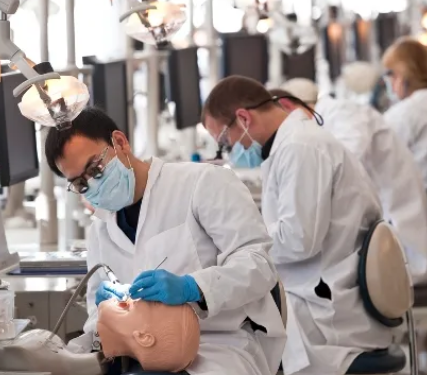To get BDS admission in China, meet eligibility, prepare documents, and apply to universities.
Table of Contents
BDS Programs in China
Bachelor of Dental Surgery (BDS) programs in China offer comprehensive education in dentistry, combining rigorous academic coursework with practical clinical training. China’s dental education system has been rapidly evolving, integrating modern technologies and research-oriented teaching methodologies to equip students with the necessary skills and knowledge.

Overview of Dental Education in China
Chinese dental education typically spans five years, encompassing a broad range of subjects including basic medical sciences, clinical dentistry, and dental surgery. Emphasis is placed on developing a strong foundation in both theoretical and practical aspects of dental care. Students gain hands-on experience through internships and clinical rotations, often conducted in well-equipped university hospitals.
Key features of dental education in China include:
- Integration of Advanced Technologies: Utilization of the latest dental equipment and technologies for training.
- Research and Development: Opportunities for students to engage in cutting-edge dental research projects.
- Multidisciplinary Approach: Exposure to various aspects of medical sciences, enhancing the understanding of dental care in a broader health context.
Accreditation and Recognition of BDS Programs
BDS programs in China must adhere to strict educational standards set by the Ministry of Education and the Chinese Dental Association. Accreditation ensures that dental schools maintain high-quality teaching practices and up-to-date curricular content.
Critical aspects of accreditation include:
Quality of Faculty: Ensuring highly qualified and experienced teachers.
Curriculum Relevance: Continuous updating of the curriculum to reflect the latest advancements in dental science.
Clinical Training Facilities: Providing state-of-the-art clinical training environments for practical learning.
Eligibility Criteria for BDS Admission in China
Gaining admission into a Bachelor of Dental Surgery (BDS) program in China requires meeting specific academic and language proficiency criteria. These requirements ensure that students possess the foundational knowledge and language skills essential for succeeding in a challenging and comprehensive dental program.
Academic Requirements
To be eligible for BDS programs in China, candidates must have:
- High School Diploma: Applicants should have completed their high school education with good grades, particularly in science subjects like Biology, Chemistry, and Physics.
- Minimum Grade Point Average: Most universities require a minimum GPA, often around 3.0 on a 4.0 scale, although this can vary between institutions.
- Science Coursework: A strong background in science, especially in subjects directly related to health and medicine, is highly advantageous.
Applicants must demonstrate their readiness for the intensive academic environment of BDS programs. A solid foundation in sciences provides the necessary background for understanding complex dental concepts and procedures.
Language Proficiency Tests
Since English is the medium of instruction for many BDS programs in China, non-native English speakers must prove their language proficiency.
Key requirements include:
- TOEFL or IELTS Scores: Universities typically require a TOEFL score of at least 80 or an IELTS score of 6.0 or higher. These thresholds ensure students can comprehend, communicate, and write effectively in English.
- Chinese Language Proficiency: For programs taught in Chinese, a HSK (Hanyu Shuiping Kaoshi) level of 4 or higher may be required, highlighting the ability to understand and use basic Chinese.
Application Process for BDS in China
Applying for a Bachelor of Dental Surgery (BDS) program in China involves a structured process, where meticulous preparation and adherence to deadlines are crucial. Candidates must gather all necessary documents and complete each step of the application with attention to detail.
Preparing Your Application
To prepare a strong application, candidates should:
- Research Universities: Investigate various dental schools in China, considering factors like program structure, faculty expertise, campus facilities, and global recognition.
- Understand Program Requirements: Each university may have specific prerequisites. Familiarize yourself with these to tailor your application accordingly.
- Prepare a Personal Statement: Write a compelling personal statement, highlighting your interest in dentistry, academic achievements, and any relevant experiences or skills.
- Academic Transcripts and Certificates: Ensure you have official transcripts from your high school and any other relevant educational institutions.
- Recommendation Letters: Obtain letters of recommendation from teachers or professionals who can vouch for your academic and personal qualifications.
Creating a well-prepared application enhances your chances of being accepted into a top BDS program in China.
Required Documents and Deadlines
Key documents for BDS applications in China include:
- Completed Application Form: Fill out the university’s application form accurately and thoroughly.
- Academic Transcripts: Provide official transcripts as proof of your educational qualifications.
- Language Proficiency Test Results: Include your TOEFL, IELTS, or HSK scores, as applicable.
- Passport Copy: A valid passport copy is necessary for international students.
- Physical Examination Record: Some universities require a medical examination to ensure you meet health standards.
- Application Fee: Pay the non-refundable application fee, the amount of which varies between universities.
Selecting the Right University for BDS
Choosing the right university for your Bachelor of Dental Surgery (BDS) is a crucial decision that impacts your career and personal development. Considerations such as the ranking and reputation of dental schools, as well as the location and campus life, play significant roles in this decision.
Ranking and Reputation of Dental Schools
When evaluating dental schools, it’s important to consider their global and national rankings, which reflect their academic quality, research output, and employment rates of graduates. Here’s a table illustrating key aspects of top dental schools:
| University Name | Global Ranking | Key Strengths | Average Tuition Fee (per year) | Graduate Employment Rate |
|---|---|---|---|---|
| University A | 1st | Advanced Research Facilities, Renowned Faculty | $20,000 | 95% |
| University B | 5th | Comprehensive Clinical Training, Diverse Specializations | $18,000 | 90% |
| University C | 10th | Modern Technology Integration, International Collaboration | $15,000 | 88% |
These rankings and statistics provide a snapshot of what each university offers, helping you make an informed decision.
Location and Campus Life
The location of the university can greatly affect your study and life balance. Consider factors like:
- City vs. Rural Setting: Urban campuses offer vibrant city life and greater networking opportunities, while rural campuses may provide a quieter environment conducive to focused studies.
- Cultural and Recreational Opportunities: Access to cultural events, sports facilities, and social clubs can enrich your university experience.
- Cost of Living: Living expenses vary significantly between different cities and regions in China.
Finances and Scholarships for BDS Students
Navigating the financial aspects of studying for a Bachelor of Dental Surgery (BDS) in China is crucial. Understanding the tuition and living costs, as well as exploring scholarship opportunities and financial aid, is key to effectively managing your finances throughout your studies.
Tuition and Living Costs
Tuition fees for BDS programs in China can vary widely based on the university and its location. Here’s a breakdown:
- Average Tuition Fee: Typically, tuition fees for BDS programs range from $15,000 to $30,000 per year, depending on the university’s prestige and facilities.
- Living Costs: Living expenses, including accommodation, food, transportation, and other personal expenses, can range from $6,000 to $12,000 per year. These costs are influenced by the city and lifestyle choices.
It’s important to budget for both tuition and living expenses to ensure a smooth educational journey.
Scholarship Opportunities and Financial Aid
There are numerous scholarships and financial aid options available for BDS students in China:
- Government Scholarships: These include the prestigious Chinese Government Scholarship, which covers tuition, accommodation, and provides a monthly stipend.
- University Scholarships: Many universities offer scholarships based on academic merit or financial need. These can cover a portion or all of the tuition fees.
- External Scholarships: Organizations and foundations also offer scholarships, often targeting specific fields or demographics.

Career Prospects After Completing BDS in China
Graduating with a Bachelor of Dental Surgery (BDS) from China opens up a world of opportunities in the dental field. Understanding the potential career paths, including employment opportunities both in China and abroad, and the requirements for licensing and further studies, is crucial for graduates to plan their futures effectively.
Employment Opportunities in China and Abroad
After completing a BDS in China, graduates have several career options:
In China: Graduates can find employment in public and private dental hospitals, research institutions, or even start their own dental practices. The growing demand for dental care in China’s expanding healthcare sector makes it an attractive market for dental professionals.
International Opportunities: BDS graduates from China are also well-prepared to pursue careers abroad. Countries with a high demand for dental care professionals, such as the USA, Canada, Australia, and several European countries, offer lucrative opportunities, though additional licensing requirements may apply.
Diverse Roles: Beyond clinical roles, BDS graduates can explore careers in dental research, teaching, or even in the dental industry, contributing to the development of dental products and technologies.
It’s important to research the job market and understand the specific requirements of each country if considering an international career.
Licensing and Further Studies
Licensing: To practice dentistry, graduates must obtain a license. In China, this involves passing a national licensing examination. For practicing in other countries, graduates must meet the licensing requirements of the respective country, which often includes additional exams and training.
Further Studies: Graduates can also opt for further studies such as Master’s or Doctoral programs in various dental specialties. Specializing in fields like orthodontics, periodontics, or cosmetic dentistry can open up more advanced and higher-paying career opportunities.
Continuing Education: Staying updated with the latest advancements in dental science is crucial. Continuous education and training are important for career growth and maintaining licensure.

